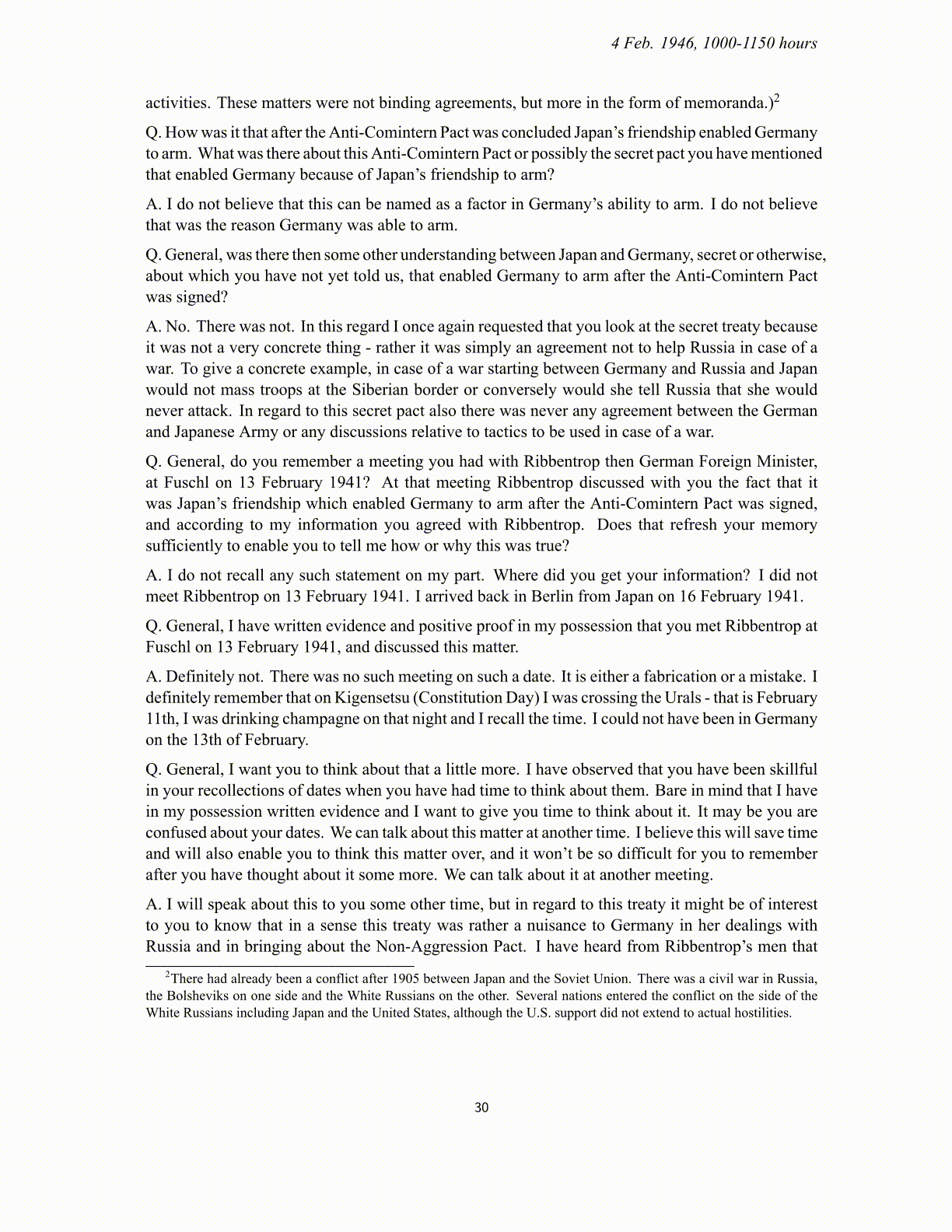
4 Feb. 1946, 1000-1150 hours activities. These matters were not binding agreements, but more in the form of memoranda.) 2 Q. How was it that after the Anti-Comintern Pact was concluded Japan’s friendship enabled Germany to arm. What was there about this Anti-Comintern Pact or possibly the secret pact you have mentioned that enabled Germany because of Japan’s friendship to arm? A. I do not believe that this can be named as a factor in Germany’s ability to arm. I do not believe that was the reason Germany was able to arm. Q. General, was there then some other understanding between Japan and Germany, secret or otherwise, about which you have not yet told us, that enabled Germany to arm after the Anti-Comintern Pact was signed? A. No. There was not. In this regard I once again requested that you look at the secret treaty because it was not a very concrete thing - rather it was simply an agreement not to help Russia in case of a war. To give a concrete example, in case of a war starting between Germany and Russia and Japan would not mass troops at the Siberian border or conversely would she tell Russia that she would never attack. In regard to this secret pact also there was never any agreement between the German and Japanese Army or any discussions relative to tactics to be used in case of a war. Q. General, do you remember a meeting you had with Ribbentrop then German Foreign Minister, at Fuschl on 13 February 1941? At that meeting Ribbentrop discussed with you the fact that it was Japan’s friendship which enabled Germany to arm after the Anti-Comintern Pact was signed, and according to my information you agreed with Ribbentrop. Does that refresh your memory sufficiently to enable you to tell me how or why this was true? A. I do not recall any such statement on my part. Where did you get your information? I did not meet Ribbentrop on 13 February 1941. I arrived back in Berlin from Japan on 16 February 1941. Q. General, I have written evidence and positive proof in my possession that you met Ribbentrop at Fuschl on 13 February 1941, and discussed this matter. A. Definitely not. There was no such meeting on such a date. It is either a fabrication or a mistake. I definitely remember that on Kigensetsu (Constitution Day) I was crossing the Urals - that is February 11th, I was drinking champagne on that night and I recall the time. I could not have been in Germany on the 13th of February. Q. General, I want you to think about that a little more. I have observed that you have been skillful in your recollections of dates when you have had time to think about them. Bare in mind that I have in my possession written evidence and I want to give you time to think about it. It may be you are confused about your dates. We can talk about this matter at another time. I believe this will save time and will also enable you to think this matter over, and it won’t be so difficult for you to remember after you have thought about it some more. We can talk about it at another meeting. A. I will speak about this to you some other time, but in regard to this treaty it might be of interest to you to know that in a sense this treaty was rather a nuisance to Germany in her dealings with Russia and in bringing about the Non-Aggression Pact. I have heard from Ribbentrop’s men that 2 There had already been a conflict after 1905 between Japan and the Soviet Union. There was a civil war in Russia, the Bolsheviks on one side and the White Russians on the other. Several nations entered the conflict on the side of the White Russians including Japan and the United States, although the U.S. support did not extend to actual hostilities. 30